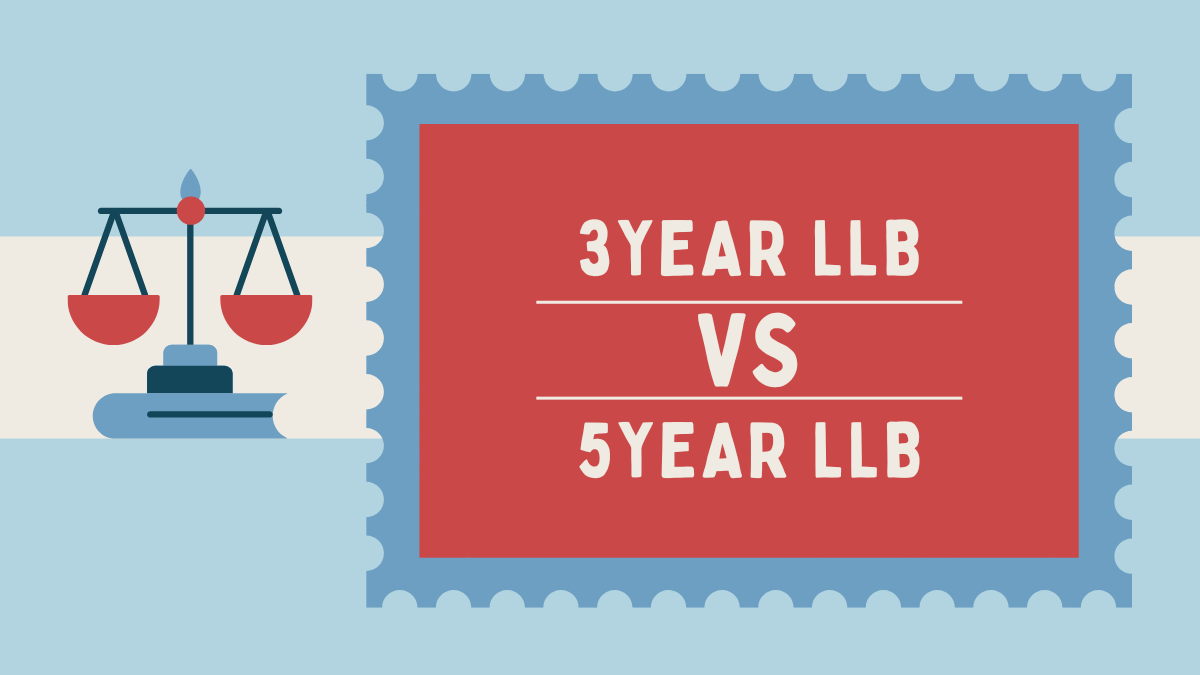Difference Between 3 & 5 year LLB Course: Currently, Education of Law is also the very popular and widely disscussed programmes in India. LLB degree programs in India are divided into two types: LLB (Hons.) and integrated LLB. Students often struggle with deciding between a 3-year or 5-year LLB program.
If you are confused in figuring out which law programme is best for you , this blog will help you get difference between 3-year law v/s 5-year law courses, their respective advantages and disadvantages as well as career prospects.
Difference Between 3 & 5 year LLB Course
Two Key Difference Between 3 & 5-year LLB Courses are regarding their course duration and eligiblity. A 3-year LLB is an undergraduate degree that focusses on essential legal courses and can be pursued beyond graduation. In contrast, a 5-year LLB is an undergraduate degree that individuals can pursue after completing class 12.
Before moving towards the Difference Between 3 & 5 year LLB Course in details let’s take a quick look at the courses in brief in terms of their course structure, duration and so on.
What is 3year LLB Course?
The 3-year LLB is a graduate course in law. The course is meant for students who have finished their Graduation in any stream like Arts, Commerce or Science.
- Eligibility: Graduation (any field) with not less than 45%–50% (depending on the university).
- Duration: 3 years (6 semesters).
- Features: Strictly law, things such as Constitutional Law, Criminal Law, Contract Law, Jurisprudence, Family Law and Company Law.
- Exams: Entrance examinations such as DU LLB Entrance, MH CET Law (3 year LLB), LSAT India and so on.
- Course fees: It may cost from INR 50000 to 5Lakh according to college.
- Some the colleges that provide 3-Years LLB course are : Delhi University, Government Law College Mumbai, Panjab University, ILS Law College Pune, BHU.
What is 5year LLB Course?
The 5-year LLB is integrated law course, which students can pursue right after passing their Class 12. It is designed to be a dual-degree programme and combines undergraduate studies (BA, BBA, B.Com or B.Sc.) including law courses, to provide a well-rounded education to students.
- Eligibility: Class 12 (any stream) with minimum 45% marks (few top NLUs ask for higher percentage).
- Length: 5 years, and 10 semesters into.
- Focus: General Education (History, Political Science, Economics, Sociology, Management, etc.) With Core Law Subjects.
- Exam: CLAT, AILET, LSAT India, SLAT& other University Level Entrance Exams.
- Colleges Providing 5 Year LLB: National Law Universities (NLUs), Symbiosis Law School, Christ University, Jindal Global Law School, Amity Law School.
Difference Between 3 & 5 year LLB Course
3 year LLB and 5 year integrated LLB are both the same and recognized by Bar council of India. The key distinction is built around entry point (12th or Graduation), course structure (integrated or standalone) and duration (5 years vs 3 years).
| Parameters | 3 year LLB course | 5 year LLB Course |
| Aspect | 3-Year LLB | 5-Year LLB |
| Eligibility | Graduation (any stream) | Class 12 (any stream) |
| Duration | 3 years | 5 years |
| Degree Awarded | LLB | Integrated degree (BA LLB, BBA LLB, B.Com LLB, etc.) |
| Course Structure | Only law subjects | Combination of law + general subjects |
| Pedagogy | Intense legal training | Broader learning with foundation + law |
| Age to Start | After graduation (usually 21+) | After Class 12 (usually 17–18) |
| Cost of Education | Comparatively lower | Higher (especially in private NLUs and universities) |
| Popular Colleges | DU, GLC Mumbai, BHU, Panjab Univ. | NLUs, Symbiosis, Christ, Jindal Global Law |
| Entrance Exams | DU LLB, MH CET (3-yr), LSAT | CLAT, AILET, SLAT, LSAT India |
| Career Scope | Same (litigation, corporate law, judiciary, academics) | Same, but with earlier start |
| Best For | Students deciding late or after graduation | Students clear about law after Class 12 |
Which one is better?
If you are sure about law in your life and are confident about it then 5 year integrated programs gives you a head start with greater exposure. If you make up your mind later then 3-year LLB is a smart.
Choose 5-Year Integrated LLB if:
- You are clear even at your school level about your career in law after Class 12.
- You should build both a general knowledge and a legal grounding.
- You can commit to a 5-year scholar financially and emotionally.
- You shoot for the best law firms, judiciary, or academia given enough early exposure.
Choose 3-Years Integrated LLB if:
- Your interest is in Law study after graduation.
- When you want to learn legal profession faster.
- When you want to switch your career from any field like( engineering , management or many more).
Career opportunity after LLB
What to do after LLB? There are so many options after completing LLB. Whether you want to be a traditional lawyer, whether you are interested in pursuing higher studies, or you have to go to other fields.
Career Opportunities After LLB
Litigation (Practice as a Lawyer/Advocate)
- Register with the State Bar Council and appear for All India Bar Examination (AIBE).
- Work in the chambers of senior advocates or go independent.
- Opportunities: Civil Law, Criminal Law, Family Law, Corporate Law, Constitutional Law (and more).
Judiciary (Judge/Magistrate)
- Appear for Judicial Services Examination of different States.
- After selection, you have scope to grow as a Civil Judge, Magistrate, and District Judge (with practice).
Corporate Sector (Corporate Lawyer)
- Employment in job roles such as Legal Advisor, Compliance Officer, In-house Counsel in MNCs, law firms or companies.
Law Firms
- Work for national or international law firms.
- High paying organizations.
Civil Services
- Get The best strategy for UPSC (IAS, IPS, IFS) or State Public Service Commission Examination and Exam Calendars.
- LLB pass-outs often hold an advantage in subjects such as polity, governance, and law.
Academics & Research
- Be Law Professor or a Lecturer by Taking LLM + PhD.
- Conduct theoretical and applied legal research, publish, and engage in policy work.
Public Sector & Government Jobs
- PSUs, Railways, Banks as well as SEBI, RBI, ONGC, BHEL, NTPC, It etc.
- Posts: Legal Advisor, Law Officer, Assistant Legal Advisor.
You can start your career with ,what fits you best according to your profile. A 3 year LLB or 5 year integrated LLB degree from any college or University recognized by Bar Council of India. The difference is when you start, how long you study and the kind of exposure you have to practice the course, largely speaking. 5 year integrated LLB if you are a Class 12 student and sure of law better option. And if you are a graduate or working professional who wants to try Law later then 3 years LLB is also the best option.









 CBSE Class 10 English Question Paper 202...
CBSE Class 10 English Question Paper 202...
 UP Board Class 10 Social Science Questio...
UP Board Class 10 Social Science Questio...
 CBSE Class 12 Physics Answer Key 2026 Ou...
CBSE Class 12 Physics Answer Key 2026 Ou...









